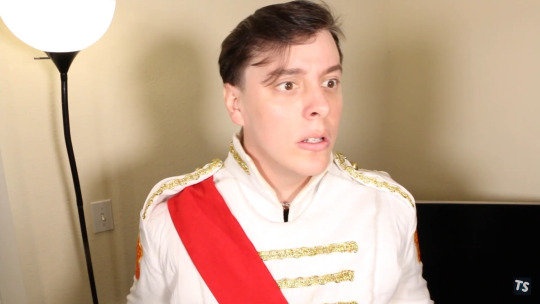#but the hero (thomas) disagrees with the villain's methods
Note
Tell us an idea for a longfic you want to write in the future.
I'm not sure if I'd ever write it, but @theeternalspace helped me brainstorm a fic involving Roman and Virgil. Like okay. You know that fandom trope in late '00s to mid 2010s fics where suddenly one of the characters is inexplicably a cat and the other character unknowingly takes them in? Yeah that but it's a superhero AU and Roman is a wannabe superhero (with no powers) and Virgil is his arch nemesis (really, a worrywart w/ superpowers who is trying to keep Roman from hurting himself).
One day, Roman runs into an actual supervillain--a crazy cat lady that has been turning people into cats. At some point Roman gets poked with the "makes people turn into cats" serum and manages to flee the crazy cat lady's grasp, but well. He still turns into a cat.
So he's exhausted from the ordeal and distraught not only failing to defeat the villain but also turning tail (haha get it?) and running away. He tries making it back to his own apartment, but ends up passing out underneath a porch of a townhouse to escape the rain (oh yeah, it's supposed to be raining).
He awakes up to find that some kind person took him inside a new toasty house and placed him on some soft blankets and what the FUCK why is it his arch nemesis, does he know who Roman actually is??
Meanwhile Virgil, absolutely NO clue that's Roman, saw a weak orange tabby stray cat on his doorstep and took him inside with the intention of taking him to the vet (there's an odd collar that looks more like a human necklace, but eh. the cat could be micro-chipped). He's had cats before so like, he's not surprised to see the orange tabby acting wary and hiding from him.
Anyways ofc Roman doesnt have a micro-chip but Virgil ends up keeping him and shenanigans occur from there. Mainly Roman slowly warming up to Virgil and realizing that he might not be an actual bad guy to begin with. And yes, the crazy cat lady's plots are foiled and Roman gets to be human again, happy ending and all.
#kat answers#roman sanders#virgil sanders#patton would be the manager/owner of a coffeeshop virgil and roman both visit#Virgil is actually close friends with Patton but somehow Roman and Virgil just comically miss one another when they visit the coffeeshop#Remus and Logan are Roman's roommates who definitely freak when Roman goes missing#Janus is Virgil's older brother who does crimes and is the arch nemesis to the actual superhero of the city (Thomas)#Janus and Thomas have one of those hero villain relationships where they both want the same thing#but the hero (thomas) disagrees with the villain's methods#so sometimes they do end up working together (namely trouncing other unsavory villains from their city)#and sometimes Thomas turns a blind eye to Janus's operations
17 notes
·
View notes
Text
Roman’s reaction when Janus said “My name...”:

Compared to Patton and Thomas:


I don’t know exactly what it is, but Roman looks somehow more horrified than simply surprised or taken aback.
It’s almost as if he doesn’t want to learn Deceit’s name.
I haven’t heard much talk about it in the fandom, but I’ve noticed that each time a side’s name is revealed is when more depth and layering is added to their character. They become more complicated and multi-faceted rather then simply being a representation of just one concept.
Let’s take Roman for example. In the first few episodes before his name reveal, Roman was presented as simply “creativity.” Even if he showed aspects of being more complex, he was still viewed only as “creativity.” However, since his name reveal, we the viewers and the other sides and Thomas view him as also encompassing “pride, ego, romanticism, and passion.”
Perhaps to Roman, who was the most adamant of everyone in Putting Others First about not being able to trust Deceit, Deceit revealing his name is a way for him to openly express more parts of himself.
In my opinion, Roman, as the ego and pride, has the hardest time accepting Janus because he knows that once he’s accepted, it will nullify much of past his work and decisions, which were made solely to contradict him as the “villain.” Similar to how he reacted when Virgil ducked out, viewing it as a good thing since he didn’t see the benefit in Thomas having anxiety and still holding on to the idea that Virgil was simply a “villain.”
Much like Patton, Roman is based deeply in his own moral integrity as a prince and a hero. Patton is the one who morally made the distinction between the main sides and dark sides, while Roman was the one who enforced that line (and also gave them their label.)
“We can’t trust him. He’s asking us to go against things we’ve known for years. Rights and wrongs, shoulds and shouldn’ts. How can’t we trust him?”
However, now that Patton, realizing how his distinction and strict rules have only hurt Thomas, has admitted he doesn’t know what to do and decides to listen to Janus, Roman, who has been acting based on Patton’s call, is now loosing sight of what it is he’s meant to protect and enforce.
Deceit now having and revealing his name is a sign that he’s ready to offer more to the table that simple lies. He wants to protect Thomas’s well-being and mental health through use of selfishness, and the others (Patton and Thomas) are welcoming him to do just that.
Unlike with Virgil’s ducking out, Roman wasn’t the only one who viewed Deceit’s contributions as needless and immoral. Both Patton and Virgil did not agree with his methods and became upset with Roman when he sided with him In SVS (and by default in Can Lying be Good). He himself sided with Janus and was burned, but now he’d being burned for not siding with him.
Roman, who for years upheld the belief with Patton that that way of thinking was wrong, had now been left alone in that sentiment and is loosing track of what role he is supposed to be serving. Yes, Roman is still creativity, but that is only a part of who he is. His ego and pride have been bruised, and his passion surely has been dwindled somewhat.
So when Janus reveals his name, Patton and Thomas react like this:


While Roman reacted like this:

When Roman laughed, it wasn’t simply to be rude. But it was to down play the impact and importance of his name, and attempt to sway the others into ignoring Janus.
That obviously backfired and we are left with one final nail in the coffin, this conversation between Roman and Patton, the two sides who worked together the most to maintain Thomas’s integrity:
“Did you forget that he’s evil! You’re not, or you’re not supposed to be. You’re supposed to be good! You can’t-”
“Roman, everything’s gonna be okay kiddo. We love you.”
“Right...”
Through out the whole video, Roman was letting Patton take the lead with the decision making. He gave him scenarios and let Patton decide what was the correct thing to do, even if he personally didn’t completely agree. However, now the one he relied on has himself become lost, stranding Roman in a place of uncertainty and insecurity.
In a desperate attempt to maintain the order he had fought so long to uphold, he tried to make sure Janus didn’t get into the group and gain influence, or else everything he’s done and believed in would fall apart. His role as a hero would become meaningless.
And that happened.
A/N: I don’t know if this made a lick of sense, I really just wanted to show Roman’s shocked/scared face and then started rambling. If you disagree or have a critic, cool.
#sanders sides#thomas sanders#roman sanders#patton sanders#janus sanders#deceit sanders#ts theories#ts theory#roman angst
4K notes
·
View notes
Note
Can I ask your opinion on Woodes Rogers?
Oh boy. Oh boy, howdy. I mean you can.
So, uhhhh the first time I was really thinking about Woodes Rogers as a character besides just being a little bitch boy was after I read Sage Street’s meta where he talks about the ways in which Rogers mirrors James in the early seasons/pre-series. And that’s pretty much how I see him.
(On a side note, while I don’t agree with everything he has to say, I highly highly recommend Sage’s meta because it brings up some really interesting parallels and scenic cues, and particularly the meta on the S3 finale just....makes me scream a lot. Some of the painting stuff can get a bit reachy because as someone who works in theatre and has friends in film, some of the parallels is likely more ‘the set designers thought this would be cool’ than a directorial choice but like, it’s still awesome to see.)
But back to Rogers. So, personally, I think he’s a little bitch boy, but that has more to do with the fact that the show sets him up as the upholder of civilization and oppression, in direct opposition to Flint - who seeks freedom and an end to persecution based on society’s morals and whom I personally vibe much more with. Character wise I actually think Rogers is pretty interesting in that, like all the Black Sails villains, he is a complex character. He is sometimes humorous, sometimes charming, and sometimes straight up unwilling to listen to anyone’s voice but his own - hello, Eleanor! (And, yeah, I’m aware that’s how a lot of people describe Flint. It’s purposeful.) While I don’t like him, I appreciate that about him.
He has a backstory that makes it clear what his motivations are and how he reacts when faced with adversity - he hates chaos and wants order and is willing to compromise his own civility if he thinks it will bring an end to those things. In my personal opinion the reason he wants so badly to bring Nassau back in line could be that he thinks it will help him get over the loss of his brother - who died in a random act of chaos and cowardly violence. (And whose name was Thomas....) Like Flint, he is fighting in the memory of someone he idolized.
The show underlines the similarity between them when Rogers says “All I have done here is finish what you began. I am now what you were then. And without you there would be no me.”
Here, he is setting himself up as the continuation of James McGraw. Which is super hella rad, since we know that Flint views himself as at least partially a wholly separate persona from James McGraw. And that we’re led to believe that ‘James’ died or was buried when Thomas was taken. While I don’t think Rogers knows the full story I think it’s likely he has a pretty good picture. I’ll direct you to this post where I bring up the fact it’s likely he and Peter were working together on the pardons(and also because I assume Eleanor told him about James being McGraw as she found out during the Charlestown plotline).
Also:
“Everyone is a monster to someone. Since you are so convinced that I am yours, I will be it.”
“If you insist on making me your villain, I will play the part.”
Rogers!! Stop!! Get your own lines!!
I know a lot of people like to compare him to Thomas, and while I think we were meant to see the parallels(hi, they’re both put in green!), I disagree he is meant to mirror what Thomas would have been. In fact, if anything, he is Thomas’ foil, even as he mirrors James.
Flint even points out this difference:
“No one is being hanged. No one’s even being tried. Just as you wanted. Just as Thomas Hamilton wanted. So what is it that you’re fighting for that I’m not already offering?”
“Thomas Hamilton fought to introduce the pardons to make a point. To seek to change England.”
Aside from the classic “I want my Thomas back you sonofabitch.” vibe of Flint’s full answer, this is the difference between Rogers and Thomas. While it would ultimately have the same effect as Rogers’ actions - to bring Nassau back to heel - I think it’s important to recognize the intentionality of both characters as it illustrates not just who Rogers is, but also Thomas.
The reason Thomas wanted to offer the pardons was to make a point that pirates are still men deserving of forgiveness. To “offer forgiveness to any man who would seek it.” He is not coming from a point of control, but of freedom. To offer to these men a way forward.
Rogers is offering the pardons as a way to bring Nassau and the pirates back into civilization but we never actually hear him offer a suggestion of what they’re to do afterwards. And indeed, with how he runs Nassau when he has it, it seems he’s much more concerned with keeping control than in offering any meaningful change to the people he governs.
Rogers is, in essence, exactly what James was talking about all those years ago when he said “Put a man on an island, give him power over other men and it won’t be long before he realizes the limits of that power is nowhere to be seen. And no man given that kind of influence will remain honest for very long.”
This is underlined in so many ways, from his scene with Berringer about ‘dark men’ to where he wants to accept the pearls he knows are from the Spanish gold, to when he straight up threatens Madi with the death of someone close to her in order to try and force her into surrender.
So, I think he’s a really cool character in that he underlines things about so many of the other characters.
However, Rogers is also a little bitch boy and I hate him because he’s is both a little confused and does not have the spirit. :)
He is everything Thomas and James were fighting against instilling in Nassau - the very thing Thomas realized isn’t the way a good leader should act. Rogers falls very much under that Hobbesian view of The Social Contract - that a monarch or person in power has absolute sovereignty without needing to give value to individuals needs or wants(literally every interaction he has with Max, hi!), whereas Thomas falls much more in line with John Locke, who says that in supporting the needs of the individual, we support the state by default.
(And I can and will go on another whole tangent about this view of Locke vs Hobbes and how it’s a theme throughout the whole show, I can, I will, please don’t let me.)
Rogers is a fantastic villain for S3 and S4 because he illustrates all the ways that civilization puts down revolution and keeps people in line - right up to how his actions ultimately cause Silver to betray the cause and sell out his own friends for a personal safety that is only marginally implied - and still leaves those on the outskirts oppressed!
Wow! Black Sails! Stop!!
And even though he as a character was eventually defeated, Rogers’ motives and ideas were actually instilled by the very rebel leaders who fought against him! It’s his treaty Rackham and Silver get the maroons to sign! It’s his version of civilization that is imposed on Nassau and the Maroon island even as he himself is ‘defeated’.
And isn’t that a kicker?
That Rackham in particular thinks he’s victorious because they’ve defeated the bad guy, but then he goes ahead and uses his plans, proving that it wasn’t the revolution or freedom or Charles’ idea of living free he was supporting at all but his own personal narrative of victory! What a sellout! What a direct parallel to how even progressive-seeming leaders will almost always sell out the ideals of their constituents for their own benefit! Boy, howdy!!
And I know fandom likes to throw him under the bus as all that is wrong with civilization - call him a little bitch boy and cheer his defeat. I know that he and Alfred Hamilton(and Peter, to an extent) get to be the villains in the narrative so our ‘heroes’ Silver and Rackham and even Flint can be put in opposition to them but like - that’s not the point. That’s not the point, that’s not the point, that’s not the point!
The point is that these men were tools of the empire - tools that were incredibly effective! They succeeded! Rogers succeeded in bringing civilization to Nassau. And in doing so he forced the pirates to choose between their own loyalties - he divided the camps until victory seemed hopeless and that is exactly how history generally works in terms of continued oppression.
Hell, that’s exactly how current political events are happening right now. It’s a tried and true method of oppressive governments to pin things on one particular person (Woodes, or, y’know, Trump?) and say ‘if you defeat this person, your revolution has been successful’ while silently just going ahead with the plans of those people’s ideals anyway. It’s not the people who are the villains. It’s the ideals they perpetuate.
All this is to say that I don’t feel particular malice towards Rogers other than that I feel towards all the characters who ultimately uphold oppression because I think Rogers is another great commentary by Black Sails on how we get so distracted fighting for what feels good that we can ultimately end up becoming exactly what we thought we were fighting against.
(”A man casts his vote for the same reason he does anything in this life. Because it feels good.”)
And finally, he’s definitely a little bitch boy for how he treats my girls Eleanor and Madi (and Max) and I would absolutely cross the street to punch him for that alone. :)
#someone: asks a question they think might get a two or three paragraph answer#milo: writes an entire fucking essay oh my god please shut up#black sails#woodes rogers#black sails discourse#long post#honestly god this is so long i have so many more thoughts too like#could write literal essays on how black sails illustrates#EXACTLY how revolutions fail#and why power is so easily shifted towards oppressors#how all the characters(YES EVEN JAMES) demonstrate this#GODODDDDDDDDDDD STOP#many thoughts head full#and this isnt even BRINGING UP his interpersonal misogyny and bullshit with eleanor lmaooo#Anonymous
97 notes
·
View notes
Text
There’s no place like Nome
https://en.wikipedia.org/wiki/Nome_King
Concerning the original depiction of the Nome King by L. Frank Baum, essayist Suzanne Rahn has suggested that he was a "distinctly American kind of monarch". Rather than a traditional king, the Nome King was more of an industrial capitalist. His power resided in controlling a monopoly. Rahn compares the king to industrialists Andrew Carnegie (1835–1919), J. P. Morgan (1837-1913), and John D. Rockefeller (1839–1937).[5] Richard Tuerk expands this theory to include the other Nome King, Kaliko. In Rinkitink in Oz (1916), Kaliko says to his allies Queen Cor and King Gos: "as a matter of business policy we powerful Kings must stand together and trample the weaker ones under our feet". In this case, Baum makes his replacement Nome king sound like a stereotypical capitalist from his time period.[5]
According to Jack Zipes, the Gnome King represents materialist greed. He is driven by a lust for power for the sake of power.[6] Once defeated, the King gains a new sinister motivation, revenge. He and his allies want to enslave people to attain wealth and power. Oz is Baum's version of the utopia and the Nome King strives to undermine this utopian civilization.[6]
Zipes believes that Baum was against any kind of violence. In The Emerald City of Oz (1910), the Nome King's invasion of Oz is therefore defeated in a non-violent way. Baum invented a fountain filled with the water of oblivion. A single sip of this water makes the drinker forget everything, including any evil intentions. The would-be invaders of Oz drink from the fountain, forget everything, and return home.[6] Zipes argues that Baum was not going for a message of turning the other cheek. He was aware that if someone uses the same methods as his/her enemies, then that person risks becoming like them. If the defenders of Oz became cutthroat and militant like the Nome King and his forces, this would have tarnished the spirit and principles of Oz. So their victory, as orchestrated by Ozma is using a different method, oblivion. The method is creative, humane, and humanitarian.[6]
Gore Vidal argued that Oz represents a "pastoral dream" deriving from the ideals of Thomas Jefferson, though here the slaves have been replaced by magic and good will. The Nome King and his black magic represent a technological civilization, driven by machines and industrialization. Vidal concluded that "the Nome King has governed the United States for more than a century; and he shows no sign of wanting to abdicate." [6]
Zipes believes that Baum was essentially a fairy tale writer. He places him in a group of writers with Charles Dickens (1812–1870), John Ruskin (1819-1900), George MacDonald (1824–1905), and Oscar Wilde (1854–1900). They brought an oppositional political perspective to their fairy tales and questioned the classical fairy tales and society at large. They reached out to young readers from the upper class, the petite bourgeoisie, and the working class. The literary fairy tale was their political weapon and they preached a message of social liberation. In Zipes words': "Their art was a subversive symbolic act intended to illuminate concrete utopias waiting to be realized once the authoritarian rule of the Nome King could be overcome".[6]
Rogers points that The Emerald City of Oz (1910) was supposed to be the finale of the Oz series. Following the end of the Nome King's invasion, Baum announced that the Land of Oz was forever closed from the outside world. The truth was that the writer had become tired of the series. In the preface of Dorothy and the Wizard in Oz (1908), Baum humorously complained that children kept asking him for more Oz tales. He claimed that he knew of lots of other stories and hoped to tell them as well. In other words, he was ready to move on to other works.[7] This complain also appeared in The Road to Oz (1909), where he hinted at a coming finale to the series.[7]
In this novel, the Nome King has lost all traces of being jolly and good-humored. He has long been stewing over his defeat and the loss of his magic belt. He feels nothing but a constant anger, which has destroyed his own capacity to feel happiness and makes his subjects miserable as well. The King himself points that he is now angry morning, noon, and night. He sees his situation as monotonous and preventing him from gaining any pleasure in life.[7] Rogers observes that the King now resembles any number of historical rulers. He has become an irresponsible tyrant, and is driven only by malice. He also resembles a naughty child given to impotent rages. He starts the book by storming and raving "all by himself". He walks up and down in his jewel-studded cavern and gets angrier all the time. He also turns his anger towards his own subjects, when they disagree with him. He punishes them by throwing them away, though Baum does not really explain the meaning of this punishment. Rogers suggests that it sounds "mysteriously horrible".[7]
Despite Baum's intentions to end the Oz series, he eventually returned to it. He continued writing it from 1912 until his death in 1919. His motivations for returning to it were the readers' continued demand for new stories, his financial need for commercially successful stories, and his own fascination with the world of Oz.[8] In this second period of Oz, Oz becomes a "socialist paradise". The threats to it are genetic experimentation and abuse of magic. The Nome King returns in Tik-Tok of Oz (1914), where he represents cruel oppression.[8]
Jason M. Bell and Jessica Bell trace the slavery and emancipation theme in the Oz tales to L. Frank Baum (1856– 1919) own childhood . As a child, Baum experienced the American Civil War (1861-1865) and the consequent Abolition of slavery in the United States. The heroes of the Oz tales tend to be abolitionists and strive to end slavery in any form. The villains are slave owners who seek to enslave others and institute slavery. The inevitable conflict between the two sides is a recurring theme in the Oz tales and has in their view contributed to the enduring popularity of the series.[9] The Bells argue that it is no coincidence that abolitionist Dorothy Gale is from Kansas. Baum was a child during the Bleeding Kansas conflict (1854-1861). Thousands of abolitionists moved to Kansas to vote against slavery, while Border Ruffians from Missouri crossed the borders to stop them.[9] The Nome King is a slave owner and a chauvinist. He is outsmarted and humiliated by Billina the hen, and literally left with egg on his face. The writers find it telling that the hyper-masculine Nomes and their King are terrified of feminine eggs.[9]
#the wizard of oz#l frank baum#king nome#fairy tales#children's literature#fantasy stories#fantasy fiction#friends of dorothy
4 notes
·
View notes